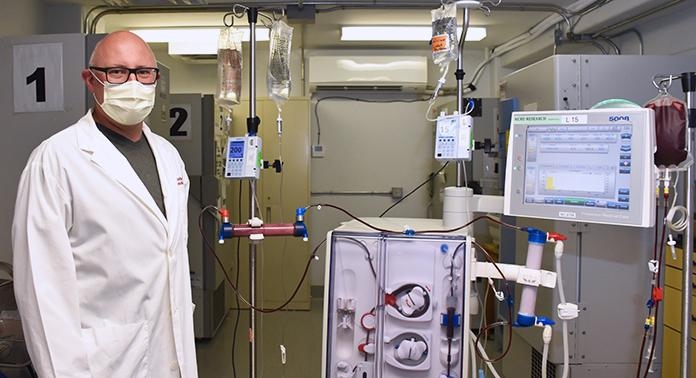'I felt better': Study finds expanded dialysis used in London, Ont. trial improving patients' quality of life
 Dr. Chris McIntyre with the expanded dialysis machine developed by Baxter International. (Supplied by Lawson)
Dr. Chris McIntyre with the expanded dialysis machine developed by Baxter International. (Supplied by Lawson)
A new form of expanded dialysis tested by researchers in London, Ont. is improving the quality of life for patients with chronic kidney disease, according to a newly published study.
Robert Wahby was a participant in a clinical trial that used this new form of expanded dialysis.
“I was hoping that trying this new dialyzer would help get rid of some of my symptoms. My appetite was down, I was a little weak and I was hoping I would sleep better.”
For Wahby the effect was definitely noticeable, “I felt better, I was eating more and I had a better night’s sleep,” he said.
Expanded dialysis works to remove a broader range of toxins from the body as compared with traditional dialysis.
The method was tested by a team of researchers out of Lawson Health Research Institute (Lawson) in London, Ont. led by Dr. Chris McIntyre with Lawson and London Health Sciences Centre (LHSC).
Patients in a clinical trial at LHSC were given expanded dialysis through a new machine made by Baxter International Inc.
The dialyzer developed by Baxter is called THERANOVA allows larger sized toxic chemicals to be filtered from the blood while allowing essential molecules to remain.
“The chemicals that can now be filtered out can cause inflammation, malnutrition and the buildup of waste,” explains Dr. McIntyre in a release.
“With traditional dialysis treatments, we haven’t been as successful at removing those chemicals and some patients experienced significant side effects.”
The study took three months and involved 28 patients. While taking part in the study participants were monitored through the London Evaluation of Illness (LEVIL) app, developed by Dr. McIntyre with the help of patient input.
With the first phase of the trial being successful, the team will now expand to included 60 dialysis patients.
The next step would be to expand to a multicenter clinical trial led by Lawson with the University of Toronto and Humber River Hospital.
You can find the published study here.
CTVNews.ca Top Stories

B.C. tenants evicted for landlord's use after refusing large rent increase to take over neighbouring suite
Ashley Dickey and her mother rented part of the same Coquitlam duplex in three different decades under three different landlords.
Mountain guide dies after falling into a crevasse in Banff National Park
A man who fell into a crevasse while leading a backcountry ski group deep in the Canadian Rockies has died.
Expert warns of food consumption habits amid rising prices
A new survey by Dalhousie University's Agri-Food Analytics Lab asked Canadians about their food consumption habits amid rising prices.
MPP Sarah Jama asked to leave Ontario legislature for wearing keffiyeh
MPP Sarah Jama was asked to leave the Legislative Assembly of Ontario by House Speaker Ted Arnott on Thursday for wearing a keffiyeh, a garment which has been banned at Queen’s Park.
Charlie Woods, son of Tiger, shoots 81 in U.S. Open qualifier
Charlie Woods failed to advance in a U.S. Open local qualifying event Thursday, shooting a 9-over 81 at Legacy Golf & Tennis Club.
Ex-tabloid publisher testifies he scooped up possibly damaging tales to shield his old friend Trump
As Donald Trump was running for president in 2016, his old friend at the National Enquirer was scooping up potentially damaging stories about the candidate and paying out tens of thousands of dollars to keep them from the public eye.
Here's why provinces aren't following Saskatchewan's lead on the carbon tax home heating fight
After Prime Minister Justin Trudeau said the federal government would still send Canada Carbon Rebate cheques to Saskatchewan residents, despite Saskatchewan Premier Scott Moe's decision to stop collecting the carbon tax on natural gas or home heating, questions were raised about whether other provinces would follow suit. CTV News reached out across the country and here's what we found out.
Montreal actress calls Weinstein ruling 'discouraging' but not surprising
A Montreal actress, who has previously detailed incidents she had with disgraced Hollywood producer Harvey Weinstein, says a New York Court of Appeals decision overturning his 2020 rape conviction is 'discouraging' but not surprising.
Caleb Williams, Jayden Daniels and Drake Maye make it four NFL drafts with quarterbacks going 1-3
Caleb Williams is heading to the Windy City, aiming to become the franchise quarterback Chicago has sought for decades.





























